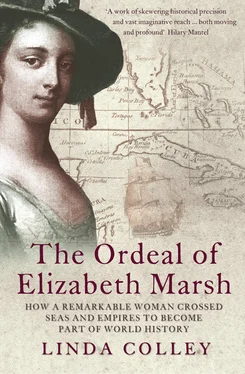This episode suggests some of George Marsh’s qualities: his ferocious capacity for industry, strong ambition, and utter belief in paperwork. It also suggests how – through him – Elizabeth Marsh was connected to yet another aspect of modernity and change. The circumstances of her birth and upbringing had already linked her with slavery, migration, empire, economic and industrious revolutions, the navy and the sea. But it was primarily through her uncle George Marsh that she connected with the expanding power of the British state at this time, and with an ever more conscious mobilization of knowledge and paperwork in order to expand that power. To paraphrase the economist J.R. McCulloch’s later verdict on the East India Company, Elizabeth’s father, Milbourne Marsh, was caught up with the power of the sword, Britain’s fighting navy; but it was her uncle, George Marsh, who exemplified the power of the pen and the ledger. 72
And he was unstoppable. He rose early every morning, drank only water, confined himself to two meals a day, took regular exercise, spent little on himself, and worked very hard. In 1750 he moved from the provinces to the tall pedimented brick building that Christopher Wren had designed for the Navy Office in Crutched Friars by the Tower of London. From 1751 to 1763, George Marsh was the Clerk in charge of seamen’s wages. He then spent almost ten years as Commissioner of Victualling, before becoming Clerk of the Acts in 1773. This was the position that Samuel Pepys had occupied after 1660, and used as a power base from which to transform the administration of the Royal Navy. Pepys, however, had been able to draw on aristocratic relations and on high, creative intelligence. George Marsh possessed neither advantage, yet he retained the Clerkship of the Acts for over twenty years, and ended his career as a Commissioner of the Navy. At his death in 1800, this shipwright’s son was worth by his own estimate £ 34,575, over £3 million in present-day values. 73
The contrast between his remarkable career and his evident personal limitations reduced some who worked and competed with him to uncomprehending fury. George Marsh, complained his own Chief Clerk in 1782, was
totally unfit for the employment as he can neither read, spell, nor write. This office has in my memory been filled with ability and dignity … but the present Clerk of the Acts has neither, and we should do ten times better without him, for he only perplexes matters. 74
Yet, as this denunciation suggests, some of the criticism George Marsh attracted at different stages in his career was rooted in snobbery, and he was always able to exploit people’s tendency to underestimate him. In reality, he wrote all the time, privately, and not just in his public capacity. His papers also confirm that he read widely and that, like his parents and his niece Elizabeth Marsh, he enjoyed constructing stories. More than any other member of his immediate family, perhaps because he spent virtually all of his life in a single country, George Marsh seems to have been conscious of the scale of the transformations through which he was living, and he sought out different ways to make sense of them. He was the one who stayed behind. He was the spectator, the recorder, the collector of memories and eloquent, emblematic mementoes. Most of all, George Marsh was someone who relished facts and information, and knew how to deploy them: ‘I am sensible my abilities fall far short of some other men’s,’ he wrote towards the end of his life, ‘but [I] am very certain no one knows the whole business of the civil department of the Navy better or perhaps so well as I do.’ 75 This massive, cumulative knowledge gave him an element of power, as did his acute understanding of how patronage worked.
As his correspondence with successive aristocratic First Lords of the Admiralty reveals, he was both unctuously deferential in his dealings with his official and social superiors, and capable sometimes of hoodwinking them. In private, and like his parents, George Marsh tended to be critical of members of the aristocracy, writing regularly about the superiority of ‘the middle station of life’, and of those (like himself) who had to work seriously hard for a living. But he was adept at the patronage game, which necessarily involved him paying court at times to ‘the indolent unhappy nobility’, and he was interested in securing advancement and favours for more than just himself. He ‘always had a very great pleasure’, he wrote, in ‘doing my utmost to make all those happy, by every friendly act, who I have known to be worthy’. 76 Chief among these worthy beneficiaries were the members of his own family. It was George Marsh’s willingness and ability to use his power and connections to promote his family that transformed Elizabeth Marsh’s expectations, and that separated her forever from the life-trajectory that might have been anticipated for a shipwright’s daughter. Having as her uncle someone with access to influence over several decades was one of the factors that made her life extraordinary. By way of George Marsh, she was able at times to have contact with some of the most powerful men in the British state, while also being helped to travel far beyond it.
His first substantial intervention in his niece’s life was indirect, but it changed everything. In January 1755, using his connections at the Navy Board, George Marsh secured for Milbourne Marsh the position of Naval Officer at Port Mahón in Menorca. 77 A ‘Naval Officer’ in eighteenth-century British parlance was not a fighting sea officer. The post was a clerical and administrative one, in an overseas dockyard, and for a ship’s carpenter it represented a distinctly unusual career break. To begin with, it tripled the family’s income. In the late 1740s and early ’50s, Milbourne had rarely earned more than £ 12 a quarter, whereas this new post brought with it an annual salary of £ 150, and the opportunity to make more.
The rise in income was only part of the alteration in the family’s status and outlook. As a carpenter aboard ship, Milbourne had been an uneasy amalgam of specialist craftsman, resident expert and manual labourer. This now changed. Nothing would ever take him completely from the sea, or from his delight in the construction of wooden ships and in drawing plans, but from now on he ceased to work with his hands for much of the time. The announcements of his promotion in the London press referred to him as ‘Milbourne Marsh Esq.’, thereby conceding to him the suffix that was the minimum requirement for being accounted a gentleman. 78
But the most dramatic change involved in his promotion to Naval Officer was one that affected his whole family, his wife, their sons, and – as it turned out – the nineteen-year-old Elizabeth Marsh most of all. In March 1755, the family left Portsmouth forever and sailed to the Mediterranean and Menorca. She was on her way.
2 Taken to Africa, Encountering Islam
MOVING TO MENORCA meant an immediate change of landscape, climate and cultural and religious milieu, and a conspicuous change of scale. Accustomed, when on land, to crowded ports in the world’s foremost Protestant power, Elizabeth Marsh now found herself on a rocky, sparsely cultivated, ten-mile-long Mediterranean island of twenty-eight thousand souls, where a sprinkling of Jews and Greek Orthodox Christians were overwhelmingly outnumbered by Catholics, and where the dominant language was a form of Catalan. Most of the four-thousand-odd Britons on Menorca were soldiers or sailors. The officers among them, and the few civilian professionals and merchants, generally held aloof from the local Catholics (who tended to cold-shoulder them in turn), organizing for themselves a cosy, desperately restricted simulacrum of social life back home. 1 In her case, the claustrophobia scarcely had time to register. What did was a rise in status marked out by shifts in behaviour and consumerism. She seems to have learnt how to ride and to have acquired a riding costume. Her father could now afford a music teacher, and she began reading sheet music, as distinct from simply memorizing tunes. And, in place of shared lodgings, she moved with her family into a substantial freestone house on Hospital Island, a twelve-acre offshore islet in Mahón harbour. She was ‘happily situated’, she wrote later, abruptly promoted to minor membership of a colonial elite, and refashioning herself in a setting where young, single Protestant women who might conceivably pass as ladies were flatteringly sparse. 2
Читать дальше












